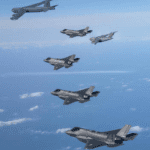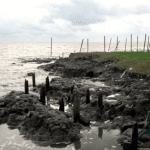Egypt has threatened to cancel its peace treaty with Israel if Israeli troops are sent into the densely populated Gaza border town of Rafah, and says fighting there could force the closure of the territory’s main aid supply route, two Egyptian officials have said.
The threat to suspend the Camp David Accords, came on Sunday after Prime Minister Benjamin Netanyahu said sending troops into Rafah was necessary to “win” the four-month-old war against the Palestinian resistance group Hamas.
Over half of Gaza’s population of 2.3 million have fled to Rafah to escape Israeli invasion in other areas, and are packed into sprawling tent camps and UN-run shelters near the border.
Egypt fears a mass influx of hundreds of thousands of Palestinian refugees who may never be allowed to return.
A ground invasion in Rafah could cut off one of the only avenues for delivering Gaza’s badly needed food and medical supplies.
An Israeli offensive on Rafah would lead to an unspeakable humanitarian catastrophe and grave tensions with Egypt,” European Union foreign policy chief Josep Borrell wrote on X.
Israel and Egypt had fought five wars before signing the Camp David Accords, a landmark peace treaty brokered by then-US President Jimmy Carter in the late 1970s.
The treaty includes several provisions governing the deployment of forces on both sides of the border.
Egypt has heavily fortified its border with Gaza, carving out a 5-kilometer buffer zone and erecting concrete walls above and below ground. It has denied Israeli allegations that Hamas still operates smuggling tunnels beneath the border, saying Egyptian forces have full control on their side.
But Egyptian officials fear that if the border is breached, the military would be unable to stop a tide of people fleeing into the Sinai Peninsula.
The United Nations says Rafah, which is normally home to less than 300,000 people, now hosts 1.4M more who fled fighting elsewhere and is “severely overcrowded.”
Egypt has threatened to cancel its peace treaty with Israel if Israeli troops are sent into the densely populated Gaza border town of Rafah, and says fighting there could force the closure of the territory’s main aid supply route, two Egyptian officials have said.
The threat to suspend the Camp David Accords, came on Sunday after Prime Minister Benjamin Netanyahu said sending troops into Rafah was necessary to “win” the four-month-old war against the Palestinian resistance group Hamas.
Over half of Gaza’s population of 2.3 million have fled to Rafah to escape Israeli invasion in other areas, and are packed into sprawling tent camps and UN-run shelters near the border.
Egypt fears a mass influx of hundreds of thousands of Palestinian refugees who may never be allowed to return.
A ground invasion in Rafah could cut off one of the only avenues for delivering Gaza’s badly needed food and medical supplies.
An Israeli offensive on Rafah would lead to an unspeakable humanitarian catastrophe and grave tensions with Egypt,” European Union foreign policy chief Josep Borrell wrote on X.
Israel and Egypt had fought five wars before signing the Camp David Accords, a landmark peace treaty brokered by then-US President Jimmy Carter in the late 1970s.
The treaty includes several provisions governing the deployment of forces on both sides of the border.
Egypt has heavily fortified its border with Gaza, carving out a 5-kilometer buffer zone and erecting concrete walls above and below ground. It has denied Israeli allegations that Hamas still operates smuggling tunnels beneath the border, saying Egyptian forces have full control on their side.
But Egyptian officials fear that if the border is breached, the military would be unable to stop a tide of people fleeing into the Sinai Peninsula.
The United Nations says Rafah, which is normally home to less than 300,000 people, now hosts 1.4M more who fled fighting elsewhere and is “severely overcrowded.”
Egypt has threatened to cancel its peace treaty with Israel if Israeli troops are sent into the densely populated Gaza border town of Rafah, and says fighting there could force the closure of the territory’s main aid supply route, two Egyptian officials have said.
The threat to suspend the Camp David Accords, came on Sunday after Prime Minister Benjamin Netanyahu said sending troops into Rafah was necessary to “win” the four-month-old war against the Palestinian resistance group Hamas.
Over half of Gaza’s population of 2.3 million have fled to Rafah to escape Israeli invasion in other areas, and are packed into sprawling tent camps and UN-run shelters near the border.
Egypt fears a mass influx of hundreds of thousands of Palestinian refugees who may never be allowed to return.
A ground invasion in Rafah could cut off one of the only avenues for delivering Gaza’s badly needed food and medical supplies.
An Israeli offensive on Rafah would lead to an unspeakable humanitarian catastrophe and grave tensions with Egypt,” European Union foreign policy chief Josep Borrell wrote on X.
Israel and Egypt had fought five wars before signing the Camp David Accords, a landmark peace treaty brokered by then-US President Jimmy Carter in the late 1970s.
The treaty includes several provisions governing the deployment of forces on both sides of the border.
Egypt has heavily fortified its border with Gaza, carving out a 5-kilometer buffer zone and erecting concrete walls above and below ground. It has denied Israeli allegations that Hamas still operates smuggling tunnels beneath the border, saying Egyptian forces have full control on their side.
But Egyptian officials fear that if the border is breached, the military would be unable to stop a tide of people fleeing into the Sinai Peninsula.
The United Nations says Rafah, which is normally home to less than 300,000 people, now hosts 1.4M more who fled fighting elsewhere and is “severely overcrowded.”
Egypt has threatened to cancel its peace treaty with Israel if Israeli troops are sent into the densely populated Gaza border town of Rafah, and says fighting there could force the closure of the territory’s main aid supply route, two Egyptian officials have said.
The threat to suspend the Camp David Accords, came on Sunday after Prime Minister Benjamin Netanyahu said sending troops into Rafah was necessary to “win” the four-month-old war against the Palestinian resistance group Hamas.
Over half of Gaza’s population of 2.3 million have fled to Rafah to escape Israeli invasion in other areas, and are packed into sprawling tent camps and UN-run shelters near the border.
Egypt fears a mass influx of hundreds of thousands of Palestinian refugees who may never be allowed to return.
A ground invasion in Rafah could cut off one of the only avenues for delivering Gaza’s badly needed food and medical supplies.
An Israeli offensive on Rafah would lead to an unspeakable humanitarian catastrophe and grave tensions with Egypt,” European Union foreign policy chief Josep Borrell wrote on X.
Israel and Egypt had fought five wars before signing the Camp David Accords, a landmark peace treaty brokered by then-US President Jimmy Carter in the late 1970s.
The treaty includes several provisions governing the deployment of forces on both sides of the border.
Egypt has heavily fortified its border with Gaza, carving out a 5-kilometer buffer zone and erecting concrete walls above and below ground. It has denied Israeli allegations that Hamas still operates smuggling tunnels beneath the border, saying Egyptian forces have full control on their side.
But Egyptian officials fear that if the border is breached, the military would be unable to stop a tide of people fleeing into the Sinai Peninsula.
The United Nations says Rafah, which is normally home to less than 300,000 people, now hosts 1.4M more who fled fighting elsewhere and is “severely overcrowded.”
Egypt has threatened to cancel its peace treaty with Israel if Israeli troops are sent into the densely populated Gaza border town of Rafah, and says fighting there could force the closure of the territory’s main aid supply route, two Egyptian officials have said.
The threat to suspend the Camp David Accords, came on Sunday after Prime Minister Benjamin Netanyahu said sending troops into Rafah was necessary to “win” the four-month-old war against the Palestinian resistance group Hamas.
Over half of Gaza’s population of 2.3 million have fled to Rafah to escape Israeli invasion in other areas, and are packed into sprawling tent camps and UN-run shelters near the border.
Egypt fears a mass influx of hundreds of thousands of Palestinian refugees who may never be allowed to return.
A ground invasion in Rafah could cut off one of the only avenues for delivering Gaza’s badly needed food and medical supplies.
An Israeli offensive on Rafah would lead to an unspeakable humanitarian catastrophe and grave tensions with Egypt,” European Union foreign policy chief Josep Borrell wrote on X.
Israel and Egypt had fought five wars before signing the Camp David Accords, a landmark peace treaty brokered by then-US President Jimmy Carter in the late 1970s.
The treaty includes several provisions governing the deployment of forces on both sides of the border.
Egypt has heavily fortified its border with Gaza, carving out a 5-kilometer buffer zone and erecting concrete walls above and below ground. It has denied Israeli allegations that Hamas still operates smuggling tunnels beneath the border, saying Egyptian forces have full control on their side.
But Egyptian officials fear that if the border is breached, the military would be unable to stop a tide of people fleeing into the Sinai Peninsula.
The United Nations says Rafah, which is normally home to less than 300,000 people, now hosts 1.4M more who fled fighting elsewhere and is “severely overcrowded.”
Egypt has threatened to cancel its peace treaty with Israel if Israeli troops are sent into the densely populated Gaza border town of Rafah, and says fighting there could force the closure of the territory’s main aid supply route, two Egyptian officials have said.
The threat to suspend the Camp David Accords, came on Sunday after Prime Minister Benjamin Netanyahu said sending troops into Rafah was necessary to “win” the four-month-old war against the Palestinian resistance group Hamas.
Over half of Gaza’s population of 2.3 million have fled to Rafah to escape Israeli invasion in other areas, and are packed into sprawling tent camps and UN-run shelters near the border.
Egypt fears a mass influx of hundreds of thousands of Palestinian refugees who may never be allowed to return.
A ground invasion in Rafah could cut off one of the only avenues for delivering Gaza’s badly needed food and medical supplies.
An Israeli offensive on Rafah would lead to an unspeakable humanitarian catastrophe and grave tensions with Egypt,” European Union foreign policy chief Josep Borrell wrote on X.
Israel and Egypt had fought five wars before signing the Camp David Accords, a landmark peace treaty brokered by then-US President Jimmy Carter in the late 1970s.
The treaty includes several provisions governing the deployment of forces on both sides of the border.
Egypt has heavily fortified its border with Gaza, carving out a 5-kilometer buffer zone and erecting concrete walls above and below ground. It has denied Israeli allegations that Hamas still operates smuggling tunnels beneath the border, saying Egyptian forces have full control on their side.
But Egyptian officials fear that if the border is breached, the military would be unable to stop a tide of people fleeing into the Sinai Peninsula.
The United Nations says Rafah, which is normally home to less than 300,000 people, now hosts 1.4M more who fled fighting elsewhere and is “severely overcrowded.”
Egypt has threatened to cancel its peace treaty with Israel if Israeli troops are sent into the densely populated Gaza border town of Rafah, and says fighting there could force the closure of the territory’s main aid supply route, two Egyptian officials have said.
The threat to suspend the Camp David Accords, came on Sunday after Prime Minister Benjamin Netanyahu said sending troops into Rafah was necessary to “win” the four-month-old war against the Palestinian resistance group Hamas.
Over half of Gaza’s population of 2.3 million have fled to Rafah to escape Israeli invasion in other areas, and are packed into sprawling tent camps and UN-run shelters near the border.
Egypt fears a mass influx of hundreds of thousands of Palestinian refugees who may never be allowed to return.
A ground invasion in Rafah could cut off one of the only avenues for delivering Gaza’s badly needed food and medical supplies.
An Israeli offensive on Rafah would lead to an unspeakable humanitarian catastrophe and grave tensions with Egypt,” European Union foreign policy chief Josep Borrell wrote on X.
Israel and Egypt had fought five wars before signing the Camp David Accords, a landmark peace treaty brokered by then-US President Jimmy Carter in the late 1970s.
The treaty includes several provisions governing the deployment of forces on both sides of the border.
Egypt has heavily fortified its border with Gaza, carving out a 5-kilometer buffer zone and erecting concrete walls above and below ground. It has denied Israeli allegations that Hamas still operates smuggling tunnels beneath the border, saying Egyptian forces have full control on their side.
But Egyptian officials fear that if the border is breached, the military would be unable to stop a tide of people fleeing into the Sinai Peninsula.
The United Nations says Rafah, which is normally home to less than 300,000 people, now hosts 1.4M more who fled fighting elsewhere and is “severely overcrowded.”
Egypt has threatened to cancel its peace treaty with Israel if Israeli troops are sent into the densely populated Gaza border town of Rafah, and says fighting there could force the closure of the territory’s main aid supply route, two Egyptian officials have said.
The threat to suspend the Camp David Accords, came on Sunday after Prime Minister Benjamin Netanyahu said sending troops into Rafah was necessary to “win” the four-month-old war against the Palestinian resistance group Hamas.
Over half of Gaza’s population of 2.3 million have fled to Rafah to escape Israeli invasion in other areas, and are packed into sprawling tent camps and UN-run shelters near the border.
Egypt fears a mass influx of hundreds of thousands of Palestinian refugees who may never be allowed to return.
A ground invasion in Rafah could cut off one of the only avenues for delivering Gaza’s badly needed food and medical supplies.
An Israeli offensive on Rafah would lead to an unspeakable humanitarian catastrophe and grave tensions with Egypt,” European Union foreign policy chief Josep Borrell wrote on X.
Israel and Egypt had fought five wars before signing the Camp David Accords, a landmark peace treaty brokered by then-US President Jimmy Carter in the late 1970s.
The treaty includes several provisions governing the deployment of forces on both sides of the border.
Egypt has heavily fortified its border with Gaza, carving out a 5-kilometer buffer zone and erecting concrete walls above and below ground. It has denied Israeli allegations that Hamas still operates smuggling tunnels beneath the border, saying Egyptian forces have full control on their side.
But Egyptian officials fear that if the border is breached, the military would be unable to stop a tide of people fleeing into the Sinai Peninsula.
The United Nations says Rafah, which is normally home to less than 300,000 people, now hosts 1.4M more who fled fighting elsewhere and is “severely overcrowded.”














